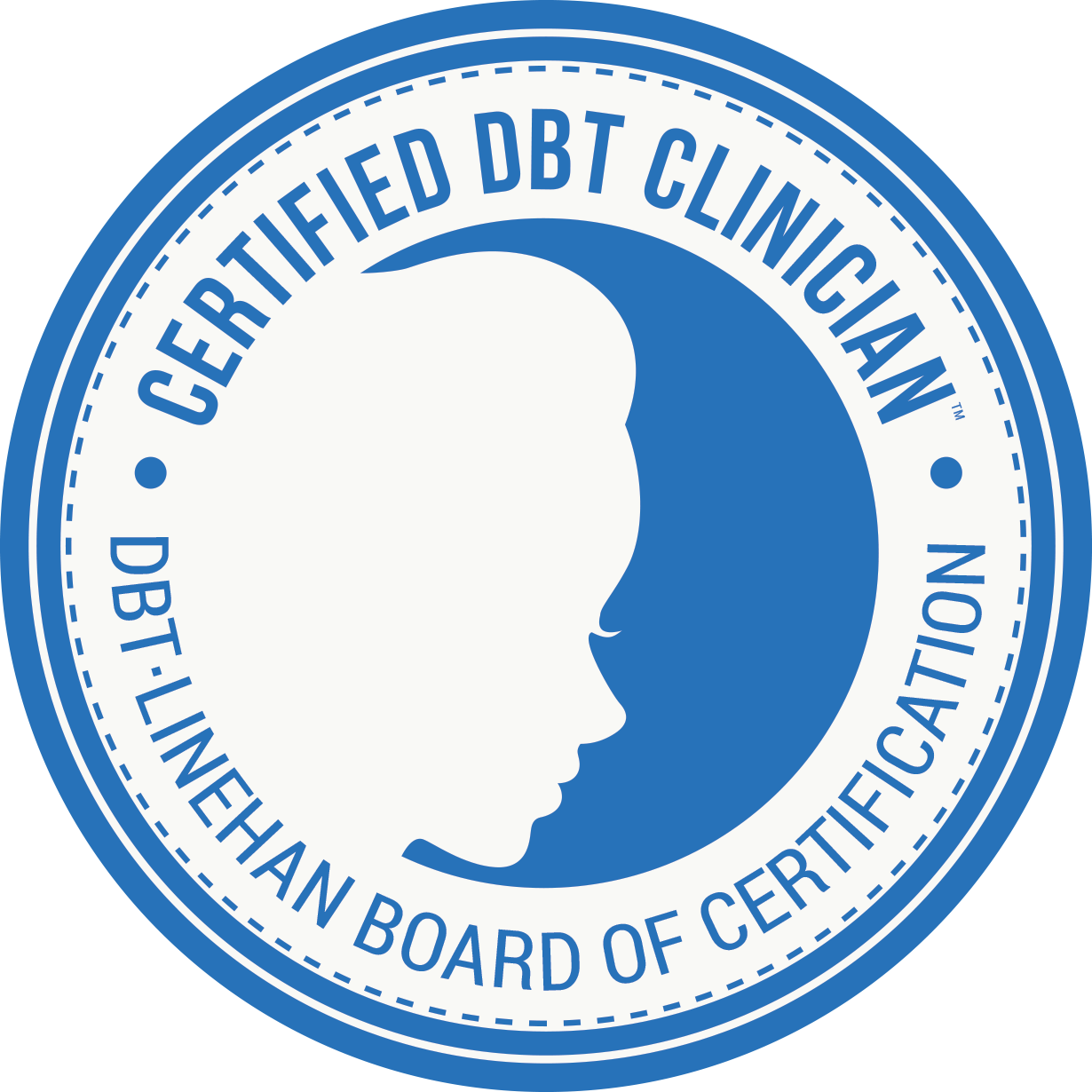In-Person & Virtual DBT Groups
Dialectical Behavioral Therapy Group Skills Training
Southlake Counseling is the only Linehan Board-Certified Dialectical Behavior Therapy (DBT) Led center in the Charlotte-Metro area.
Program Overview
DBT is widely considered the gold standard for treating many mental health issues, and a key component of our counseling programs. Being certified means that we offer all of the necessary components to deliver DBT most effectively for our clients. Adherence to the Linehan model is proven to improve patient outcomes.
Virtual DBT Group(s)

Tuesday – Adult DBT Skills Training
WHEN:
8-Week Modules held weekly on Tuesdays from 6-7:30pm
FACILITATORS:
Lalanea Chastain (MPA, MSW, LCSW)
Julianna DeStefano (MS, LCMHC-A, NCC)
Thursday – Adult DBT Skills Training
WHEN:
8-Week Modules held weekly on Thursdays from 6-7:30pm
FACILITATORS:
Lalanea Chastain (MPA, MSW, LCSWA)
Unique Earley (M.Ed, LCMHC-A)
DBT Living is a advnaced online skills training graduate group for those who have completed one year of comprehensive DBT.
WHO:
Adults who’ve completed one year of DBT
WHEN:
8-Week Modules on Wednesdays from 10 AM – 12:30 PM, each 90 minutes long
FACILITATORS:
Laleanea Chastain (MPA, LMSW, LCSW)
COST:
$400 for 8-weekly sessions
In-Person DBT Group

16405 Northcross Drive, Suite G Huntersville, NC 28078Monday – Adolescent & Parent DBT Skills Training
WHO:
For adolescents in 9th-12th grade (high school) and their parents
WHEN:
8-Week Modules held weekly on Mondays from 5:30-7:00 pm
WHERE:
Southlake Counseling – Charlotte:
4724 Park Rd, Unit D, Charlotte, NC 28209
FACILITATORS:
Sheena Beach (MSW, LCSW-A, LISW-CP)
Julianna DeStefano (MS, LCMHC-A, NCC)
Andrew Patterson (MSW, LCSW-A)
Tuesday – Adolescent & Parent DBT Skills Training
WHO:
For adolescents in 9th-12th grade (high school) and their parents
WHEN:
8-Week Modules held weekly on Tuesdays from 5:30-7:00 pm
WHERE:
Southlake Counseling – Huntersville:
16405 Northcross Drive, Suite G Huntersville, NC 28078
FACILITATORS:
Kimberly Krueger (MSW, LCSW)
Heather Daniels (MSW, LCSW-A)
Apiffany Gaither (MS, LCMHC)
Angelika Kudla (MS, LCMHCA, NCC, CRC)
Thursday – Adult DBT Skills Training
WHEN:
8-Week Modules held weekly Thursdays from 11-12:30 pm
Starting May 29th, 2025
WHERE:
Southlake Counseling – Davidson
903 Northeast Dr, Ste 201, Davidson, NC 28036
FACILITATORS:
Kimberly Krueger (MSW, LCSW)
John Kihm (LCMHC-A)
Thursday Adult DBT Skills Training
WHEN:
8-Week Modules held weekly on Thursdays from 5:15-6:45 pm
WHERE:
Southlake Counseling – Charlotte
4724 Park Rd, Ste. D, Charlotte, NC 28209
FACILITATORS:
Sheena Beach (MSW, LCSW, LISW-CP)
Ally Bradshaw (Intern)
Adolescent & Parent/Adult RO-DBT Skills Class
WHO:
The adolescent class is intended for adolescents ages 14-18. The parent/adult class is intended for caregivers of adolescents in the adolescent class as well as adults 18+ who identify as overcontrol.
WHEN:
10-week-long modules for a total of 30 weeks.
WHERE:
Southlake Counseling – Huntersville
16405 Northcross Dr., Huntersville, NC 28078
FACILITATORS:
Apiffany Gaither (MS, LCMHC)
WHAT:
RO-DBT is tailored for clients who need an irrational or excessive amount of control. RO-DBT focuses on receptivity and openness, flexible control to adapt to changing environmental conditions, and intimacy and social connectedness to form close, lasting bonds.
This therapy is most beneficial for clients with Obsessive-Compulsive Disorder (OCD), Paranoia, Chronic Depression and Anxiety, and other areas where they need to learn to let go and be open to change.
If the client is experiencing difficulty expressing emotions, hyper-detailed or rule-governed behavior, distant style of relating, and high social comparison, they may benefit from an RO-DBT skills training course. At least one caregiver is required to participate weekly with adolescents in a skills training class.
How Does Group DBT Skills Training Work?
Interested participants are required to attend weekly individual counseling sessions while enrolled in skills training, either at Southlake or through an outside provider. An initial intake and a minimum of two pretreatment sessions are required to participate in any DBT skills training group.
Once in a DBT Skills Training group, participants will begin to discuss and practice the following topics:
- Distress Tolerance
- Emotion Regulation
- Mindfulness
- Interpersonal Effectiveness
- Middle Path Module
Groups will meet weekly for discussion and will be assigned homework after each session to practice newly-learned skills.
DBT Overview
DBT is a behavioral intervention program designed to treat a wide range of disorders, most of which are associated with difficulties regulating emotions and associated cognitive and behavioral problems. Therapists work to enhance the capability (skills) of their clients as well as to develop the motivation to change.
What To Expect From DBT:
Individual Therapy
Work one-on-one with your DBT therapist to identify and work on your goals and targets and how to apply new skills and strategies.
Skills Training
Group therapy focuses on Core Mindfulness, Emotion Regulation, Interpersonal Effectiveness, and Distress Tolerance.
Group skills training is an essential part of the Dialectical Behavior Therapy (DBT) curriculum.
Phone Coaching
You will have access to your DBT therapist for assistance in your day-to-day life when you need help applying the skills you’ve learned.
Therapist Consultations
Your DBT therapist attends weekly DBT team meetings to ensure they are providing the most effective treatment.
DBT is evidence-based, meaning research shows that when it is done right, it works. Being Linehan Board-Certified Led means that our founder, Kimberly Krueger, ensures that all DBT therapists and programs at Southlake adhere to the model developed by Dr. Marsha Linehan.
You can be confident that Southlake’s DBT programs contain the necessary components and organization to deliver DBT as it was intended and with the most effectiveness.
Note: Southlake Counseling offers several DBT groups for both children (ages 11-18) and their parents and young adults (18+) to teach techniques on how to better regulate emotions and improve relationships with others.

Southlake Counseling is DBT- Linehan Board Certified. By adhering to their evidence-based curriculum, we’re able to ensure clients and families that we’re following a model that has been proven to decrease self-harm rates and lower treatment dropout.
Our Program Adheres to the 4 pillars of Dialectical Behavioral Therapy (DBT):
Individual Therapy
Our personalized one-on-one sessions are designed to address your unique needs, helping you build coping skills and strategies for a healthier, more balanced life.
Group Therapy
Engage in supportive group settings where you can share experiences, gain insights from others, and practice new skills in a collaborative environment.
Phone Coaching
Access real-time support through phone coaching to help you apply DBT skills in everyday situations, ensuring you have the guidance you need, when you need it.
Consult Team
Our dedicated team of professionals collaborates regularly to review cases and provide comprehensive support, ensuring the highest quality of care for every client.
Continued DBT Support and Skills Training
“I graduated my DBT program, what’s next for me?”
We’re glad you asked! We offer DBT Living, an online skills training graduate group designed for individuals who have successfully completed one year of comprehensive DBT (Dialectical Behavior Therapy). Led by experienced therapist Lalanea Chastain, MPA, LMSW, LCSW, this group will offer a supportive, non-judgmental, and skillful environment to continue your DBT practice.

Reserve Your Spot Today!
DBT is a structured, evidence-backed form of therapy that teaches and encourages the practice of coping mechanisms to help clients whose emotions make it difficult to cope with daily situations.

CONTACT
LOCATIONS
Charlotte
Davidson
Huntersville
Concord
VIRTUAL SERVICES IN:
North Carolina
South Carolina
Florida
Vermont
Kansas
California
Arizona
Live Happier.
Love Deeper.
Start Now.



